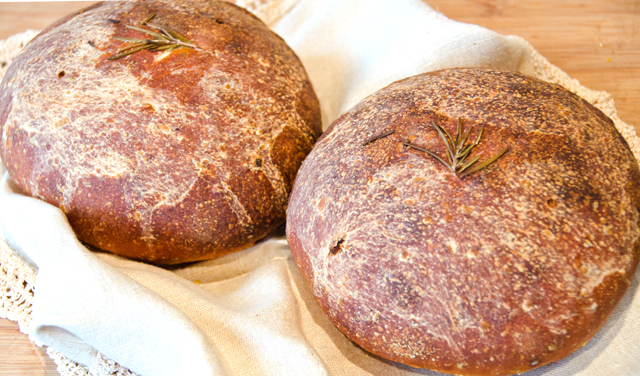I have always loved to make bread. Not that I was always good at it, in fact many of my first loaves were less than stellar. Armed with my Betty Crocker and Good Housekeeping cookbooks, I made multiple attempts at white, wheat and whole grain breads. My biggest problem was yeast, or my lack of success in proofing it. The loaves would turn out flat and leadened, thrown outside as crumbs for the birds. My father used to say, the birds wouldn’t even eat my bread, it was too heavy to fly away with! I am happy to say that my tenacity paid off and have made many delicious loaves since those days.
I have a sizable collection of books dedicated to breads in my cookbook library. One of my favorites is The Bread Bakers Apprentice authored by Peter Reinhart, former professional baker and current baking instructor at Johnson and Wales University. The first half of the book is set up like a well written text book. In this section he examines bread making through mastering the twelve stages of baking. Reinhart’s desire is to empower his readers not to be dogmatic but to follow the “spirit of the law”; bakers who understand their options and thus will be able to bring about their desired outcomes. The second half are the recipes or formulas as he refers to them, with accompanying beautiful photography.
It was a cup of leftover mashed potatoes that inspired me to make his Potato Rosemary bread for Thanksgiving dinner. The bread is a two day process. The first day, the biga is made, a preferment of bread flour, water and yeast that rises once and ferments overnight in the refrigerator. The second day the biga is mixed into the other ingredients to make a delcious fragrant loaf. Scented with fresh rosemary, the potatoes give the bread a soft, tender texture and the optional roasted garlic gives it an extra dimension of flavor. The roasted garlic is easy to do. My method is to cut enough of the tops off of the garlic to expose the cloves. Place the garlic on a sheet of aluminum foil large enough to wrap them in. Drizzle a little olive oil over the cloves, wrap them up and bake in a 375F oven for about 45 minutes. The fragrant toasty brown cloves will easily slip out of their skins. Potato rosemary bread is a fantastic recipe that will complement your dinner table on any occasion.
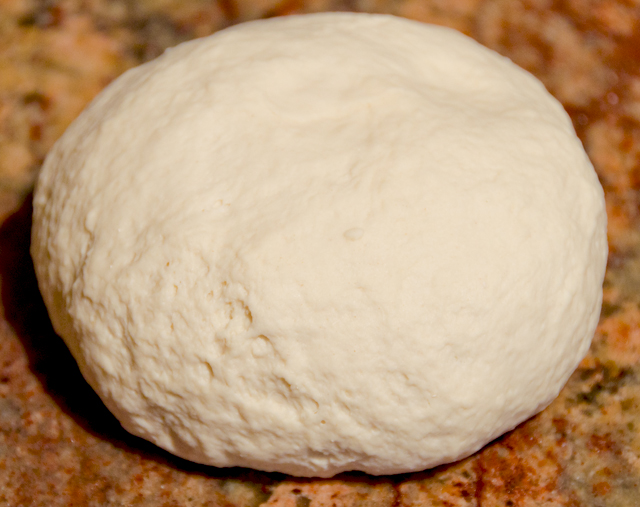
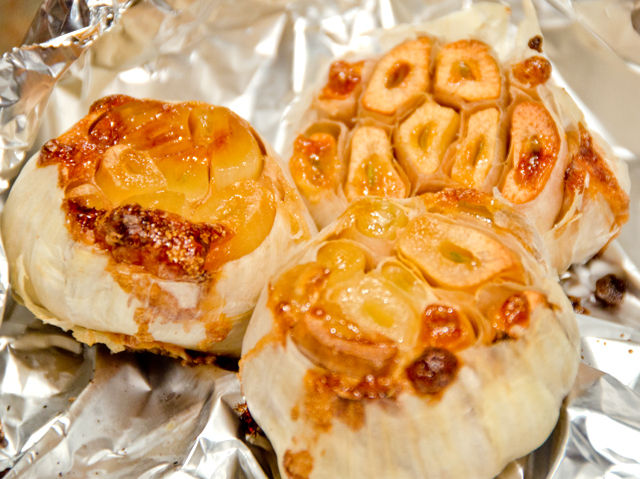
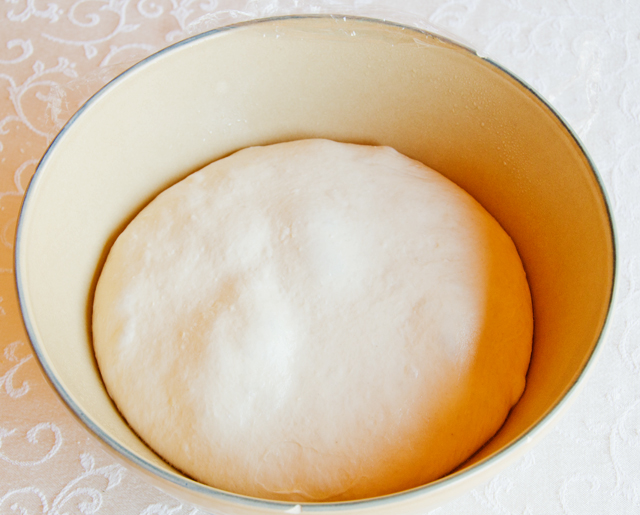
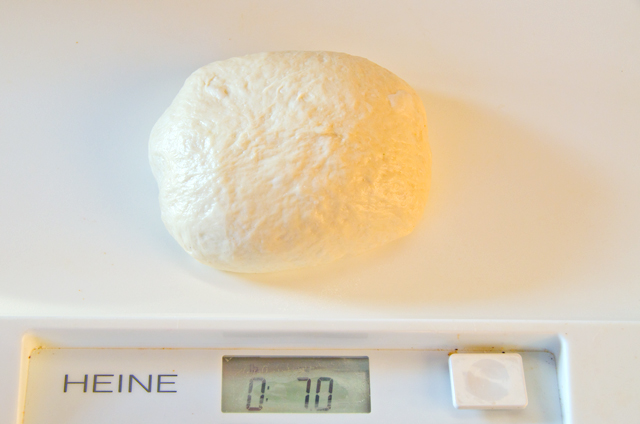

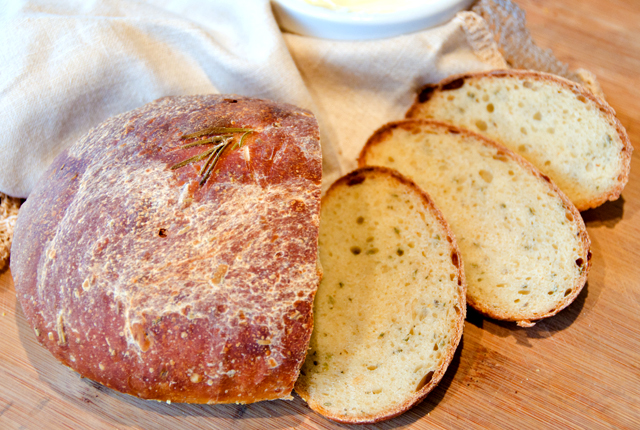
Potato Rosemary Bread
from The Bread Baker’s Apprentice by Peter Reinhart
Days to make: 2
Day 1: 2 1/2 to 4 hours biga.
Day 2: 1 hour to de-chill biga; 12 minutes mixing; 4 hours fermentation, shaping and proofing; 20 to 45 minutes baking.
Ingredients for the biga
- 2 1/2c unbleached bread flour
- 1/2t instant yeast
- about 1c of water at room temperature
Ingredients for the bread
1 1/4c Biga
3 c plus 2T unbleached bread flour
1 1/2 t salt
1/2 t black pepper, coarsely ground (optional)
1 1/4 teaspoons Instant yeast
1 c mashed potatoes
1 T olive oil
2 T coarsely chopped fresh rosemary
3/4 c plus 2T to 1c water, at room temperature (or warm if the potatoes are cold)
4T coarsely chopped roasted garlic
Semolina flour or cornmeal for dusting
Olive oil for brushing on top
Biga
Directions
- Stir together the flour and yeast in a 4-quart bowl (or the bowl of an electric mixer). Add the water, stirring until everything comes together and makes a coarse ball (or mix on low speed for 1 minute with the paddle attachment). Adjust the flour or water, according to need, so that the dough is neither too sticky nor too stiff. (It´s better to err on the sticky side, as you can adjust easier during kneading.)
- Sprinkle some flour on the counter and transfer the dough to the counter. Knead for 4 to 6 minutes (or mix on medium speed with the dough hook for 4 minutes), or until the dough is soft and pliable, tacky but not sticky. The internal temperature should be 77° to 81°F.
- Lightly oil a bowl and transfer the dough to the bowl, rolling it around to coat it with oil. Cover the bowl with plastic wrap and ferment at room temperature for 2 to 4 hours, or until it nearly doubles in size.
- Remove the dough from the bowl, knead it lightly to degas, and return it to the bowl, covering the bowl with plastic wrap. Place the bowl in the refrigerator overnight. You can keep this in the refrigerator for up to 3 days, or freeze it in an airtight plastic bag for up to 3 months.
Dough
Directions
- Remove the biga from the refrigerator 1 hour before you plan to make the bread and weigh out the portion you need, the above recipe makes more than twice that amount. Refrigerate or freeze the remainder for another recipe.
- Stir together the flour, salt, black pepper, and yeast into a 4-quart mixing bowl (or the bowl of an electric mixer). Add the biga pieces, mashed potatoes, oil, rosemary and 3/4 cup plus 2 tablespoons water. Stir with a large spoon (or mix on low speed with the paddle attachment) for 1 minute, or until the ingredients form a ball. Add more water, if neccesary, or more flour, if the dough is too sticky.
- Sprinkle flour on the counter, transfer the dough to the counter, and begin to knead (or mix on medium speed with the dough hook). Knead for about 10 minutes (or 6 minutes by machine), adding more flour if needed, until the dough is soft and supple, tacky but not sticky. It should register 77° to 81°F. Flatten the dough and spread the roasted garlic over the top. Gather the dough into a ball and knead it by hand for 1 minute (you will probably have to dust it with flour first to absorb the moisture from the garlic). Lightly oil a large bowl and transfer the dough to the bowl, rolling it around to coat it with oil. Cover the bowl with plastic wrap.
- Ferment at room temperature for about 2 hours, or until the dough doubles in size.
- Remove the dough from the bowl and divide it into 2 equal pieces. Shape each of the pieces into a boule. Line a sheet pan with baking parchment and dust lightly with semolina flour or cornmeal. Place the dough on the parchment, separating the pieces so that they will not touch, even after they rise. Mist the dough with spray oil and cover loosely with plastic wrap.
- Proof at room temperature for about 2 hours or until the dough doubles in size.
- Preheat the oven to 400°F with the oven rack on the middle shelf. Remove the plastic from the dough and lightly brush the bread with olive oil. You don´t need to score this bread, but you can if you prefer.
- Place the pan in the oven. Bake for 20 minutes, then rotate the pan 180 degrees for even baking. The loaves will take 35 to 45 minutes total to bake. The loaves will be a rich golden brown all around, and the internal temperature should register at least 195°F and make a hollow sound when thumped at the bottom. If the loaves are fully colored but seem too soft, turn off the oven and let them bake for an additional 5 to 10 minutes to firm up.
- Remove the finished loaves from the oven and cool on a rack for at least 1 hour before serving.
